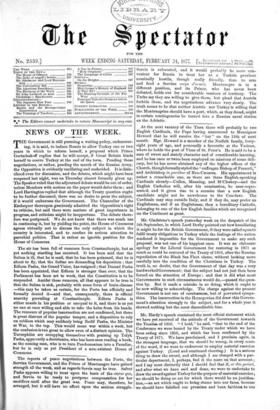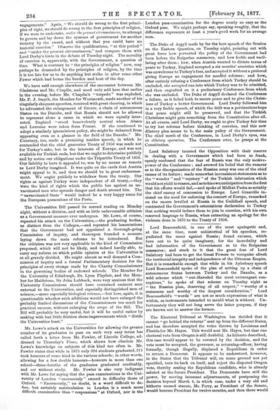Mr. Hardy's speech contained the most official statement which we
have yet received of the attitude of the Government towards the Treaties of 1856. "I hold," he said, "that to the end of the Conference we were bound by the Treaty under which we have been acting since 1856, and which has been confirmed by the Treaty of 1871. We have proclaimed, and I proclaim again, in the strongest language, that we should be wrong, in every sense of the word, if we were to endeavour to employ material coercion against Turkey. (Loud and continued cheering.) It is a serious thing to draw the sword, and although I am charged with a par- ticular department, I, perhaps, feel it the more on that account ; and I say most distinctly that I should feel that if, at this period, and after what we have said and done, we were to undertake to draw the sword against Turkey for the purpose of material coercion, we should be doing an act for which there would be no justifica- tion,—an act which ought to bring shame into our faces, because we should have falsified our promises and been faithless to our engagements." Again, "We should do wrong to the first princi- ples of right, we should do wrong to the first principles of religion, if we were to undertake, under the present circumstances, to attempt to govern and lay down the systems of government for another country by the sword, and without that you could have no material coercion." Observe the qualifications, "at this period" and "under the present circumstances," and compare them with Lord Derby's hints in the debate of Tuesday night. The morality of coercion is, apparently, with the Government, a question of time. What is contrary to "the principles of religion" now, may perhaps be demanded by the principles of religion, by the time it is too late for us to do anything but strike in after some other Power which had borne the burden and heat of the day.



































